The Perfect Story
La parfaite histoire
Michelle Shephard
2021
| 73 min 40 s
Documentary
Original version in English, Somali and Norwegian with English Subtitles
Awards and Festivals
DGC Best Canadian Documentary Feature Grand Jury Prize Calgary International Film Festival, Canada (2022)
Nomination - Best Documentary ProgramCanadian Screen Awards, Toronto, Canada (2023)
Nomination - Best Original Music, DocumentaryCanadian Screen Awards, Toronto, Canada (2023)
A Frequent Flyer Films and NFB co-production
The Perfect Story is a heart-wrenching and provocative look at journalism, belonging, the stories we tell, and who gets to tell them. The film follows the decade-long relationship between Canadian journalist Michelle Shephard and Ismael Abdulle, a young Somali refugee who had his hand and foot cut off by the terrorist group al-Shabab. Their story begins in 2010, when they met during one of Michelle’s reporting trips to Mogadishu for the Toronto Star. Her articles about Ismael sparked a movement within the Somali diaspora that helped him escape Mogadishu and find refuge in Harstad, Norway, 200 kilometres north of the Arctic Circle. For nearly a decade, Ismael embraced his new home, learning to speak Norwegian fluently and attempting to adapt to his new country. When Ismael goes back to Mogadishu, an unexpected turn of events forces Michelle to defy one of journalism’s golden rules—“report the story, don’t become part of it”—and makes her question her role as a storyteller.
Poster
Synopses
One-liner
This riveting, intimate look at the relationship between a foreign correspondent and a young Somali refugee explores the psychological toll of the stories we tell.
Two-Line Description
The Perfect Story offers a riveting, intimate look at the ethical and moral challenges sparked by the relationship between a foreign correspondent and a young Somali refugee. By revealing the boundaries of journalism and filmmaking, the film questions what stories are told, why, and who gets to tell them.
Q & A with filmmaker Michelle Shephard
- Anyone who hears Ismael’s story will have empathy for him and his situation. When you first heard his story, what compelled you to want to bring it to a wider audience?
I had covered Somalia for years as part of my national security beat at the Toronto Star, and I was always looking for ways to connect readers with what was going on there, in terms of the country’s ongoing civil war and the rise of al-Shabab, the group that would later join forces with al-Qaeda. The best way was to find compelling personal stories that could also tell the larger story of what was happening in the country. Ismael was a young, articulate survivor, with an incredible story of what happened to him. A longtime contact of mine—a Toronto-based journalist who had returned to Somalia to work as a communications director for the office of the president—was helping Ismael and wanted me to interview him. It was part of the reason I had travelled to Mogadishu for that trip. I just knew readers would connect with him, and that first interview was the basis of my initial Star article on Ismael in 2010.
- Over the years you’ve explored many complicated issues—from your work on the ground during 9/11, and your book on the aftermath, to your profile of Omar Khadr in the book and doc Guantanamo’s Child. How does this documentary tie into your work as a journalist and filmmaker?
Making this documentary forced me to look back over my career of the past two decades and think hard about the stories we tell and why. I was always drawn to complicated characters and had prided myself on tackling controversial cases like Omar Khadr’s story. Ismael’s story, however, was one of the easiest to tell—or so I thought. Making this film reminded me that no story is ever really simple.
- This film takes unexpected turns. When did you realize that the story was taking a different direction, and how did you deal with that, both as a filmmaker and as a subject?
This was definitely not the film we thought we would be making. But in many ways, it turned out to be a more crucial one, because of the questions it poses about journalism and storytelling. I suspect it’ll make some viewers uncomfortable, and that’s not a bad thing. I want the documentary to spark a discussion.
We realized about halfway through production that the film would have to change, and thankfully Ismael agreed and bravely continued. My primary concern had always been for his well-being, as this was really difficult for him. And while I did not really want to be a big part of the film, I realized the role I had played in telling his story and started asking myself some tough questions. It felt disingenuous to not talk about this.
All films are team efforts, but this one was more so than most, as it was so personal. The traditional lines of journalism felt blurred. At times it was difficult to have perspective, and I’m lucky we had a rock-solid team.
- What factors pressured Ismael into telling a “perfect story”? Does this happen more often than we think?
Yes, I do think this happens more often than we think. It’s amazing to think that Ismael was just a teenager, traumatized after having suffered horrendously, and he had the wherewithal to know that he must concoct a ‘perfect story.’ I don’t want to answer for him as to why he did that, but I think in the film he explains that he was worried people wouldn’t be sympathetic if they knew all the facts. I wish I could say I thought he was wrong—but he’s probably right.
- The film explores the ethical issues of getting too close to a subject and a story in real time. How do you navigate the ethics of telling your subjects’ stories, especially subjects who may be in a vulnerable position?
We have a duty to care for those we are profiling, whether it’s in journalism or in film. Sometimes it’s just inevitable that you’ll become close. Our film confronts that issue, but I’m not sure I would have done anything different in telling Ismael’s story. What I’m still figuring out is where all the lines should be drawn, and I think that must be decided on every individual case.
After he saw the documentary I made on Omar Khadr, Ismael asked if we could make one together, and at first it felt like working on other stories that I had done with him. But making this film brought up so many journalism and filmmaking questions. It did confirm for me that journalism cannot be purely objective, and that we cannot just safely report from 30,000 feet. We like to say we ‘bear witness,’ but we do more than that. Journalists all tell stories through a certain lens. And filmmaking, because of what it involves in terms of time and expense, inevitably changes the story, and makes the filmmaker a part of it.
- Did your relationship with Ismael change over the course of making the documentary? And if so, how?
It did. I had stayed in touch with Ismael over the years since I met him in 2010, and visited him when I was in Norway. We were friends, as much as you could be considering the age gap, geographic distance and fact that I was still the journalist telling his story. But he’s had a tough time, struggling with coming forward with this truth, and I think I just remind him now of a painful period in his life. He has seen the film and understands why it needs to come out, but I think he wants to leave this chapter of his life behind him. I completely understand and respect that, so while we’re still in touch, we don’t talk nearly as often.
- With the sources from which we get our news becoming more globalized, how is the role of the foreign correspondent changing? What do you see as the responsibility of journalists covering international stories today?
More than anything, it’s to provide context. The need for an independent, free press has never been greater, and so the role of foreign correspondents is to be the on-ground experts, empowering and amplifying the voices from the countries they are covering. In the future, I also hope to see more partnerships with international and domestic media, where local reporters can tell their own stories on an international stage and get all the protections and benefits that foreign correspondents have. I never could have told this story without Somali-Canadian journalist Sahal Abdulle, who is also an associate producer on The Perfect Story and personally got involved with helping Ismael forge a new life outside of Mogadishu.
- What would you like viewers to take away from the film, above all else?
I really hope the film has the viewer thinking critically about journalism and the media we consume. We all love fairy tales and the ‘perfect story,’ but when is that ever really the case? I also hope people respect Ismael for telling his truth. He didn’t have to. Maybe it sounds a bit trite, but I also do hope the film reminds people about the importance of empathy and perspective, not serving to provide fodder for xenophobia or a public distrust in the media.
Excerpts
Excerpt 2 - Original Story
Excerpt 3 - Close Friends
Excerpt 4 - First Meeting
Excerpt 5 - Canadian connection
Contact NFB publicist for broadcast–quality excerpts.
Images
Loading...

Download
Loading...
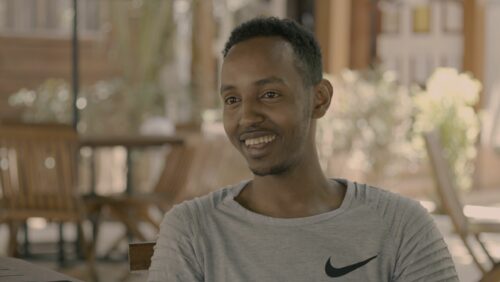
Download
Loading...

Download
Loading...
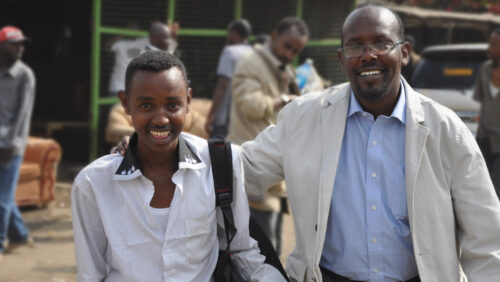
Download
Loading...
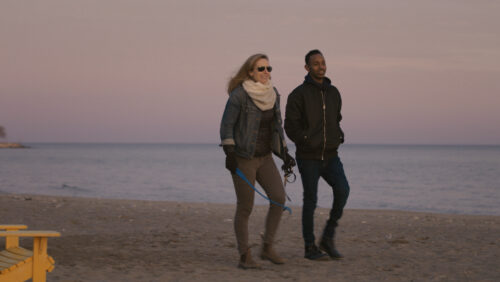
Download
Loading...
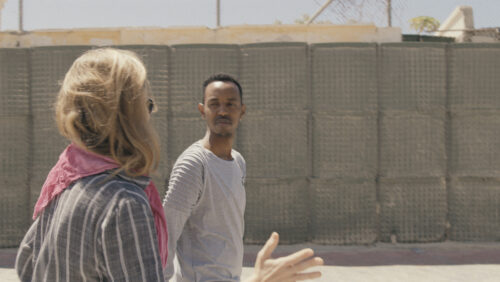
Download
Loading...
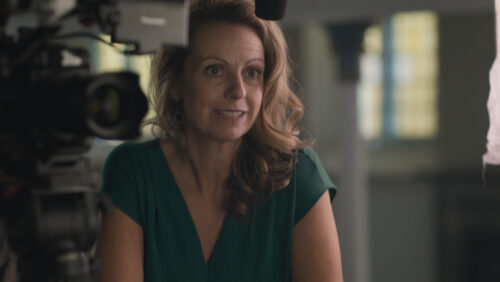
Download
Loading...

Download
Contact NFB publicist for high-resolution images for print.
Team
Michelle Shephard
Writer and Director, Producer and Executive Producer
Photo
Photo : Jim Rankin
Bryn Hughes
Producer, Executive Producer (Frequent Flyer Films)
Photo
Photo : Johan Hallberg-Campbell
Lea Marin
Producer (NFB)
Photo
Photo : NFB
Anita Lee
Executive Producer (NFB)
Photo
Photo : NFB
Jane Jankovic
Executive Producer (TVO)
Photo
Credits
THE NATIONAL FILM BOARD OF CANADA and TVO PRESENT
A FREQUENT FLYER FILMS AND NFB CO-PRODUCTION
Written and Directed by
Michelle Shephard
Produced by
Bryn Hughes
Lea Marin
Michelle Shephard
Executive Producers
Bryn Hughes
Michelle Shephard
Executive Producer, NFB
Anita Lee
Executive Producer, TVO
Jane Jankovic
Independent Production Officer, TVO
Linda Fong
Featuring:
Ismael Abdulle
Sahal Abdulle
Co-Producer and Editor
Nick Hector, BFE CCE
Music Composed and performed by
Justin Small and Ohad Benchetrit
Featuring Esmaeel Abofakher and
Laura Bates on violin
Cinematographer
Wesley Legge
Associate Producers
Sahal Abdulle
Kate Vollum
Visual Researcher
Erin Chisholm
Additional Camera
Iris Ng
Christian Bielz
Steve Russell
2nd unit Camera
Dan Dougay
1st Assistant Camera
Dina Attalla
Sound Recordists
Chandra Bulucon
Dave Draper
Jim Ursulak
Additional Sound Recordists
Nathaniel Gustin
David Best
Brad Dawe
Dane Kelly
Mary Wong
Story Editor
Nick Hector
Post Production Supervisor
Edwin Janzen
Assistant Editor
Alysha Baker
Sound Editing by
SOUND DOGS TORONTO
Sound Supervisor
Nelson Ferreira
Sound Effects Editor
Jack Madigan
Recording Engineer
Spencer Clerk
Studio Assistant
Stefana Fratila
Post Production Facility
REDLAB
Account Manager
Mark Stevens
Head of Post Production
Carmelo Gallé
Sound Studio Manager
Steven Gurman
Project Manager
Jeff Hocken
Colourist
AJ McLauchlin
Re-recording Mixer
Eric Apps
Online Editor
Cory Johnson
DI Conform
Shawn Zacchigna
For the NATIONAL FILM BOARD OF CANADA:
Studio Operations Manager – Mark Wilson
Production Supervisor – Marcus Matyas
Senior Production Coordinator – Katie Murray
Technical Coordinator – Kevin Riley
Studio Administrators – Andrew Martin-Smith, Patricia Bourgeois
Marketing Manager – Melissa Wheeler, Jessica Gedge
Publicist – Jennifer Mair
Legal Counsel – Peter Kallianiotis
Stills Photography
Michelle Shephard
Graphics
Nick Sewell
Sasha Jordan Appler
Production Coordinator
Bryn Hughes
Production Accountant
Dania Kannan
Fixer – Nairobi, Kenya
Benta Ochieng, Viewfinders Kenya
Fixer – Mogadishu, Somalia
Bashir Osman, Peace Hotel
Transcription and Translation
Laurel Toews
Nuruddin Qorane
Astrid Larsen
Special Thanks
Adrienne Arsenault
Nahlah Ayed
Sherien Barsoum
Celena Bell
Lori Chodos
Hannah Donegan
Ilwad Elman
Geoff Ewart
Omar Faroq
Dr. Anthony Feinstein
Mohamed “Tennis” Gilao
Kathleen Goldhar
Abdirashid Hashi
John Haslett-Cuff
Nina Hellvik
The Hughes Family
Ahmed Hussein
Gwen Joy
Justine Keyserlingk
Christine Kleckner
Todd Light
Lynn McAuley
Kim Nelson
Iris Ng
Deqa Nur
Bashir Osman
Cornelia Principe
Jim Rankin
Randy Risling
Astrid Shau-Larsen
Ann Shin
Asha Siad
Roda Siad
Magali Simard
Jason Statten
Olwen Statten
Tanya Talaga
Sunny Yi
David York
Mahad Yousef
Berkeley Church
International Muslims Organization Toronto
Ishtar Restaurant
Staff and Security at Peace Hotel, Mogadishu
Toronto Star
Archival Footage
Aaron Y. Zelin/Jihadology.net
AP Archive
AP Photo
CBC Licensing
Douglas & McIntyre
F.I.L.M. Archives
From Toronto Star. © 2001, 2006, 2010, 2013, 2014 Toronto Star Newspapers Limited. All rights reserved. Used under license.
Jim Ursulak
Journeyman Pictures Ltd.
Michelle Shephard/Toronto Star/Getty Images
Mustaqbal Media
NRK
Peter Power/Toronto Star/Getty Images
Princeton School of Public and International Affairs
REUTERS/Mowliid Abdi
Screenocean/Reuters
What Took You So Long?
© 2012, Randy Risling/Toronto Star Newspapers Ltd.
Insurance
Lesya Kozoriz, Front Row Insurance Brokers
Legal
Sandra Richmond and Diana Cafazzo,
Stohn Hay Cafazzo Dembroski Richmond
Produced with the participation of
THE CANADA MEDIA FUND,
ROGERS DOCUMENTARY FUND,
ROGERS TELEFUND,
ONTARIO CREATES
AND GOVERNMENT OF CANADA

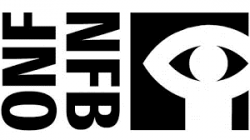
© 2021 2727458 Ontario Inc. and The National Film Board of Canada
Media Relations
-
About Frequent Flyer Films
Frequent Flyer Films is a Toronto-Based production company dedicated to challenging character-driven films that tackle some of the most pressing issues of our time. Founders Bryn Hughes, an award-winning producer and veteran journalist and filmmaker Michelle Shephard, came together in 2018 to create Frequent Flyer Films, bringing with them two decades of experience working in some of the most difficult terrains in the world, with a keen eye to poweful and thought-provoking storytelling.
www.frequentflyerfilms.ca
-
About the NFB
Founded in 1939, the National Film Board of Canada (NFB) is a one-of-a-kind producer, co-producer and distributor of engaging, relevant and innovative documentary and animated films. As a talent incubator, it is one of the world’s leading creative centres. The NFB has enabled Canadians to tell and hear each other’s stories for over eight decades, and its films are a reliable and accessible educational resource. The NFB is also recognized around the world for its expertise in preservation and conservation, and for its rich and vibrant collection of works, which form a pillar of Canada’s cultural heritage. To date, the NFB has produced more than 14,000 works, 7,000 of which can be streamed free of charge at nfb.ca. The NFB and its productions and co-productions have earned over 7,000 awards, including 11 Oscars and an Honorary Academy Award for overall excellence in cinema.